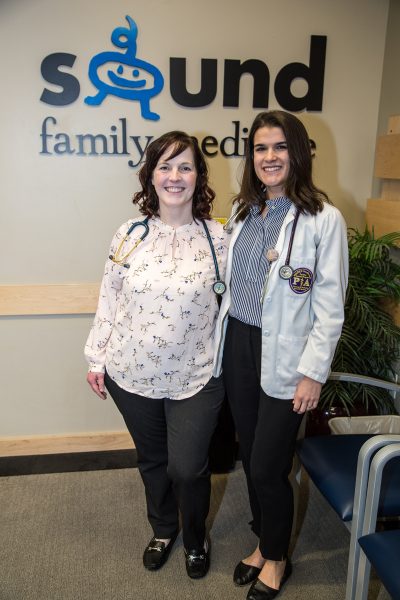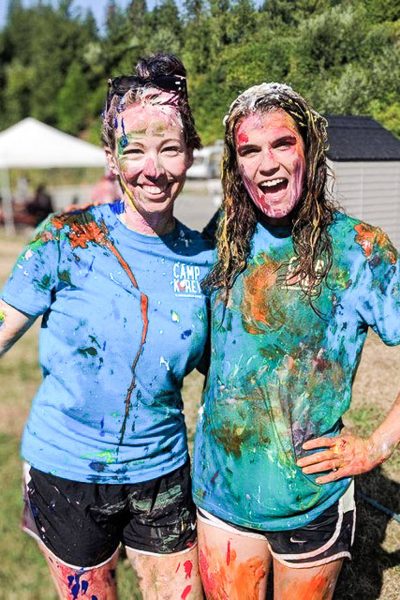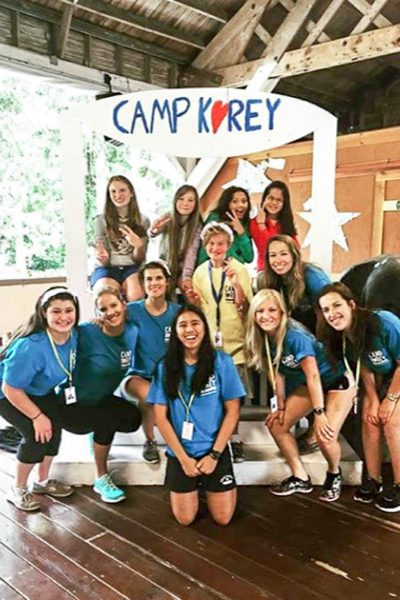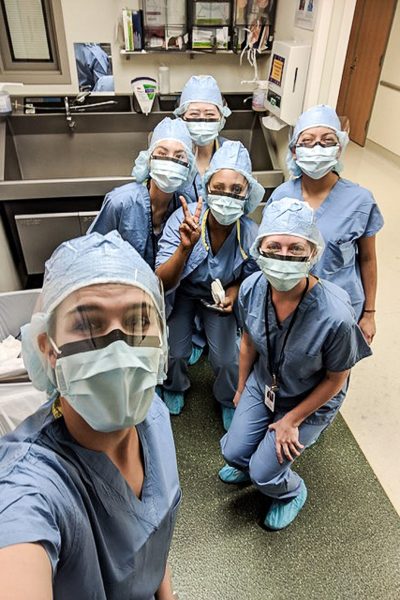Emily Storesund of MEDEX Seattle Class 52 is in her 4-month family medicine preceptorship at Sound Family Medicine in Puyallup, WA.
“Coming right up out of the didactic classroom was initially a little bit nerve-racking, knowing that I was going to have to transfer all that knowledge that I learned into real-life practice,” Emily tells us. “But it’s actually been a really easy transition, a lot easier than I thought. Tracie has been great at throwing me in there, having a lot of trust in me and helped me gain a lot of confidence early on. It’s been really helpful.”

Tracie Johnson, PA-C of Sound Family Medicine with Emily Storesund
Tracie is Tracie Jefferson, PA-C— a full-time practitioner at Sound Family Medicine and herself a graduate of MEDEX Northwest Tacoma Class 1 from 2015. Consequently, she knows the MEDEX training model.
“It gives me a lot of confidence to put our students out there,” adds Tracie. “As a preceptor, I know that I can give them some free rein, let them jump in and start doing trial by fire. Then you get someone as talented as Emily who’s able to build great rapport. I think the way MEDEX selects their candidates really translates well into communication with patients.”
Under Tracie’s guidance, Emily has been exposed to patients’ continuity of care.
“One of the things that’s been really satisfying about my four months here is really building those relationships, seeing patients come in time after time,” Emily says.
Near the beginning of her rotation at Sound Family Medicine, Emily saw a patient who was trying to get pregnant.
“And then, just this past week we saw her for her first OB visit,” she says. “It’s exciting to be able to follow the patients, build those relationships and help them in their health goals. I’ve been able to work with so many different populations from newborn babies to geriatric patients. I’m really interested in pediatrics, so I’ve seen a lot of kiddos and OB patients as well. It’s been very thorough and very rewarding.”
Prior to attending MEDEX Northwest for her physician assistant education, Emily Storesund worked as a certified nursing assistant in a variety of different settings including a nursing home, an inpatient mental health facility and on an inpatient medical/surgical floor at a critical access hospital. But her earliest medical experience started at Camp Korey, part of a collection of camps founded by Paul Newman called the SeriousFun Network.

Emily and fellow Camp Korey staff member volunteering at the “Silly Olympics” during the summer of 2019.
“Once I got into college, I ended up getting a summer job out here in the Pacific Northwest at a summer camp for kids with different medical conditions and chronically ill children.”
Each week the camp would bring together 50 to 60 kids living with one particular area of illnesses. In this environment, they could relate to each other and learn to build strength and confidence.
“It’s extremely empowering for the children,” she says. “It was so motivating for me to work alongside these awesome kids and their medical providers in such a unique setting.”
Emily spent most of her summer years throughout college working there out of love, and that experience confirmed the fact that she wanted to go into medicine.
“I was passionate about helping people, and I liked working with kids,” she says.
“The big thing that my Camp Korey experience taught me is that it’s important to provide joy anywhere you can throughout life.”
“The big thing that my Camp Korey experience taught me is that it’s important to provide joy anywhere you can throughout life. That’s one thing that I hope to take from camp into my practice as a future PA—to provide joy, and try not to take myself too seriously throughout work with patients and patient care.”

Emily with fellow Camp Korey staff and campers during the summer of 2015.
As a child herself, Emily ended up in the hospital for an acute care episode. In many ways, this experience shaped her future in medicine.
“I had many different doctors over a lot of different visits,” she says. “And there were a lot of questions. It took people some time to figure out what was happening, and it was scary for me and my family. But I remember the support of the medical providers that we had, the staff that helped us and that sense of, ‘Okay. These people are really here to ease our fears.’”
Emily remembers walking out of the hospital thinking, ” I would love to do something like this one day and give back in the way that they gave to me.”
Emily grew up in Kentucky before her family began moving to a number of different places.
“I spent a little bit of time in Montana after living in Kentucky, but now Seattle is where I call home,” she tells us. “I live here with my husband and our new puppy.”
Emily and her husband moved to Seattle so she could attend MEDEX. But the application process to MEDEX was challenging and long.
“I was actually a reapplicant,” she says. “I applied my first year but I didn’t get an interview. I was a bit disappointed. I also knew that MEDEX was a really highly-ranked program, and I kind of applied as, ‘Okay, let’s see what happens. Maybe I’ll get in.’”
After being denied that first time, Emily was motivated to work harder towards her MEDEX reapplication. Most of the advice she received was for increased patient contact.

Emily and classmates learning how to scrub in for their future surgical rotations.
“I already had a good bit, but obviously MEDEX is very competitive, and one of the things they really focus on is having a good, solid foundation for working with patients. And that was actually right before I got the job at the hospital in Montana. That experience alone, I wouldn’t take that back for anything.”
At North Valley Hospital in Kalispell, Montana, Emily got to work alongside nurses and doctors in a busy setting with critically ill patients.
“So, I think it was very worth it. I gained a lot more patient contact, worked on other parts of my application, reapplied, ended up landing an interview, and got accepted.”
Initially, Emily viewed the denial as a kind of setback.
“Thinking about the process of doing everything over again was extremely challenging. But I’m 100% happy that I did because I landed on my first-choice program. I couldn’t be happier.”
Emily will return to North Valley Hospital in June for her surgical rotation as a MEDEX PA student.
Now a member of MEDEX Seattle Class 52, Emily Storesund is appreciative of her fellow students, their various backgrounds and skillsets.
“We have people who are paramedics, medical assistants, nursing assistants, and respiratory therapists,” she says. “I think just having so much diversity and a variety of skills is great. People come together and share their skills. That’s been really helpful.”
Occupying a classroom with 50 people over the course of a year means that you quickly become friends.
“Having their support has been awesome, and I don’t think I would’ve made it this far without the support of my classmates,” she concludes.
With an eye towards graduation in August of 2020, Emily is keeping an open mind about what kind of medicine she wants to practice.
“I have about six rotations ahead of me and my mind could easily change,” she tells us. “But I actually do enjoy family medicine a lot. I could definitely see myself working primary care maybe with urban underserved populations.”
She’s aware there’s a lot of need for that in Seattle. And because Emily is interested in pediatrics, she’s considering working with underserved youth.
“Kids and families that are underserved—that’s something I would really enjoy as well. And then another side of me thinks, ‘Oh, I worked in inpatient medicine before PA school, and loved the hustle and bustle and excitement of being in the hospital.’ So, I’m also considering inpatient medicine, too. I guess it’s best to keep an open mind overall.”
We asked Emily to tell us more about her wishes to bring joy into medicine.
“There’s a lot of things in medicine that are not joyful,” she says. “But all it takes is approaching each patient with a smile on your face, taking that extra 30 seconds to try to get to know them a little bit, or asking them about their day. It’s just finding something that sets it apart from another visit at the doctor’s office and brings a smile to your patient’s face. Just little things and celebrating the little moments, you know. If somebody’s labs changed for the better, say, if they were able to bring their prediabetes back down to a safe A1C where they’re out of that warning zone, celebrate that and congratulate your patients. Making sure that they know that you’re there to be their cheerleader and support them.”
We think preceptor Tracie Jefferson, PA-C nicely sums up Emily Storesund’s character and future as a physician assistant.
“Emily’s drive to come in each day and grow a little bit, her ability to connect with patients on a variety of levels, and passion for providing them with the education they need to better their health is going to make her a fantastic PA, no matter where she might go.”

























